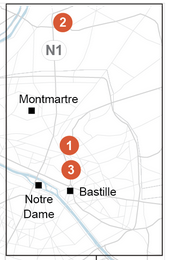PARIS -- Nov. 13, 2015, has gone down as one of the darkest days in French history since World War II, when 130 people were killed in the capital in an Islamic State assault on daily life: a concert, a soccer game and cafes.
It's been a year since the attack on Paris' Bataclan concert hall -- where 90 of the victims died -- and several restaurants in a lively neighborhood of the city. It's now apparent that that attack was only the beginning. In the 12 months since, the same terrorist cell behind the Nov. 13 attacks also struck a Brussels subway and airport, and a lone wolf inspired by the Islamic State, also known as ISIS, drove a truck through crowds gathered in Nice, France, to celebrate a national holiday.
Another lone-wolf attacker murdered a French police officer and his partner in the presence of the couple's 3-year-old child, live-streaming the gruesome affair on Facebook. Little more than a month later, two other attackers slit the throat of an 85-year-old village priest, in the middle of a weekday Mass. In almost every case, the attackers were fellow French or European passport-holders content to murder their fellow citizens.
These assaults by homegrown terrorists have created a backlash against Muslims -- France's largest minority group -- equating them as a threat to national security and striking at the heart of one of the nation's most sacred virtues: the ideal of fraternity.
But one group in particular has mobilized to defend that sense of fraternity threatened by the young terrorists. As unlikely as it is diverse, that group is made up of those who survived the Nov. 13 attacks and family members of those who died.
In the year since the attacks, a surprising number of them have published books and made art in response to their grief. While each tells a different personal story, all share the same general message: Hatred is unacceptable.
This message has made Antoine Leiris a celebrity in France. His wife, Helene Muyal-Leiris, 35, was killed in the Bataclan concert hall last year, where she had gone to attend the Eagles of Death Metal concert that night. In a Facebook post shortly after that went viral, Leiris directly addressed his wife's killers: "You will not have my hate," he said.
Those words now form the title of a memoir he has published in France and the United States, which appeared late last month.
In an interview, he said that writing was a means of self-preservation in the midst of a tragedy that not only left him without a wife but their 17-month-old son, Melvil, without a mother.
"After the attacks, the moments of writing were moments of escape," Leiris said. "Words for me are little magnificent things that carry something immense in them. It's words that permitted me at once to understand reality at the same time as departing it."
Yet his message was always clear: Any sort of revenge is beside the point.
"The only thing that matters is that she's no longer here," Leiris wrote in his book. "Guns, bullets, violence -- all of this is just background noise to the real tragedy now taking place: absence."
Fred Dewilde, 50, said he agrees. Dewilde was inside the Bataclan on Nov. 13, trapped on the floor as the terrorists fired rapidly into the crowd. He responded by writing a graphic novel that details his experience in the siege, trying to help a young woman next to him only to emerge drenched in her blood.
His book, My Bataclan, also published last month, is especially firm in its rejection of Islamophobia. France, he wrote, should not use the attack as an excuse to "fall fearful of the scarf, the dark one or the Other."
Pressed to elaborate, Dewilde went further, describing the rise of the National Front after the attacks.
"France is changing and taking the worst possible policy path," he said in an emailed statement. "I feel that many Americans must feel that today with the election of [Donald] Trump. A shame of being human. A fear of what France is. A fascist country."
Finally, there is Danielle Merian, 78, or "Granny Danielle," as the French have come to call her. Neither victim nor survivor, she was just a neighborhood resident who insisted on French television after the attack that it was essential to "be friendly to Muslims, who practice their religion freely and kindly."
Her comment transformed her into something of an unlikely mascot for the Muslim community in the midst of a tense political moment.
"It was important to reach out to Muslims," she said, "because they were the first victims of ISIS."
A Section on 11/13/2016
